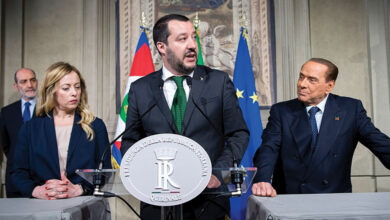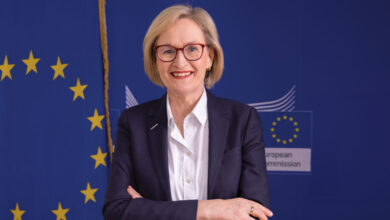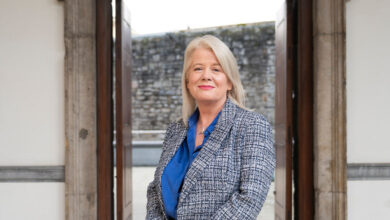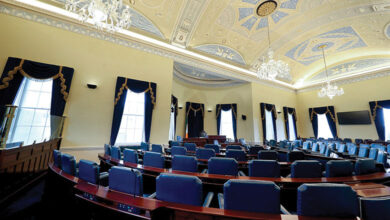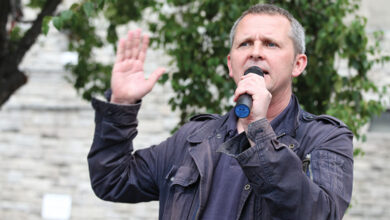Trying to turn a corner
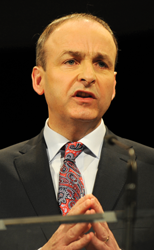 Stephen Dineen assesses Fianna Fáil’s first árd fheis since 2009 and speaks to party members and TDs on its direction.
Stephen Dineen assesses Fianna Fáil’s first árd fheis since 2009 and speaks to party members and TDs on its direction.
While Fianna Fáil would have hoped its first árd fheis under a new leader (and the 2011 electoral drubbing) would be the chance to draw a line under the past, it was never far away. Several speakers mentioned how good it was to be back in the RDS, home of árd fheiseanna in days of old. Yet the venue also hosted a working abroad fair that weekend. Another old bastion of Irish society stared across the road at members: the headquarters of AIB. Reminders of the party’s legacy from government loomed large.
Leader Micheál Martin made efforts on several fronts to put distance between the party and the past. In his opening speech he told members he is determined that “the people who belong to Fianna Fáil and support Fianna Fáil will never again be let down by low standards.” Action would be taken against any Fianna Fáil member found by the Mahon tribunal report to have abused their position. He pointed out that fundraising details are now transparently published.
On Saturday the party adopted new rules for candidates on declarations of compliance with standards in public office, while a ‘one member one vote’ rule was adopted for election candidate selection.
Later that evening Martin apologised for Fianna Fáil’s mistakes in government: “We were in government and we should have acted differently. We made mistakes. We got things wrong. And we are sorry for that.” The comment drew loud applause and a standing ovation.
A strong theme of Martin’s leadership has been education. The former teacher used the speech to attack government decisions on small, rural and DEIS schools, resources for pupil guidance and counselling and the abolition of maintenance grants for post graduate students. While reforms “have to be implemented” he did not give specifics, but called for an agenda focused on the “core skills of literacy and maths.”
Members
Amidst what seemed a subdued mood over the weekend, members who spoke to eolas expressed hope of renewal.
For Marian Gallagher of Carrignavan, County Cork, the party is “actually bringing in the youth a lot more”. She noted that “there was a lot of young speakers, especially from the Dublin area,” on the first night of the conference.
Among its young members is Órlagh Smith, a business student in DCU. “I see young entrepreneurs, ideas, innovation, technology and I think that Fianna Fáil should represent those people,” she said. “And honesty: I think honesty is a big, big thing that Fianna Fáil really need to get back to now, especially to young people.”
Declan Daly, an accountant from Douglas, County Cork, believes the party is still “re-identifying itself”. A modern version of republicanism, “coupled with being representative and making sure there is equality within our society”, are core values for Daly, which he believes are “genuinely accepted throughout the party too.”
The past lurked in the mind of Áine Holt, an assistant principal of Kylemore College, Ballyfermot, and member of a Dublin West cumann. “People are very worried, puzzled, upset: a mixture of feelings,” she says. “There’s one thing coming through: absolute and utter shock at the way things have turned out.
“Years and years ago I remember questions being raised when I was a child about Charlie Haughey and his finances, and these questions were always swept under the carpet,” Holt added. “People used to say: ‘Ah yeah, but you know it’s Charlie etc’, but they were ignored and I’ve a feeling that the same thing has happened yet again,” she says. “And what people are probably hoping is that we could break that cycle and stop this history repeating itself.”
Fianna Fáil TDs remained positive about the future. Finance Spokesman Michael McGrath was encouraged by the conference’s new format. “I think in recent years árd fheiseanna became quite stage managed and the debate really was sterile, and so we’re trying to get away from that by involving the members, allowing them to have their say and also by bringing in outside panellists who may well hold views that are entirely different to party views.”
The party is “a progressive, republican party,” he stated. Its key tenets have to be about “enterprise, which really is a way to liberate people who are unemployed and those who are in economic difficulty, and also about education,” along with traditional values concerning the Irish language and re-unification.
As for the threat from Sinn Féin (again the second most popular party in a Red C poll on the weekend of the conference), McGrath says: “I think many people would like to believe, as we all would, that there is an easier way out, and Sinn Féin are very cleverly tapping into that sentiment.” Fianna Fáil is not dismissive of Sinn Féin as they have a democratic mandate, but “we certainly won’t be conceding any ground to them.”
Justice, Equality and Defence Spokesman Dara Calleary, another younger member of the parliamentary party, said Fianna Fáil must “get back into communities.” He added: “We kind of stood back from communities around the country. We’ve got to be in people’s doors, dealing with their issues and I think if we do that we will renew.”
For Limerick TD and party treasurer Niall Collins, the party must be mindful of its finances. Last year it raised over €1 million through a national church gate collection, national draw and social events. Ninety-five per cent of party funding (higher in 2011 than 2010) “was amounts from individuals of €50 and less.” Collins says the party is “looking at being a broad-based party, being funded by small amounts of money from a broad church of people.”

